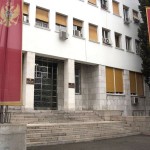 (Podgorica, 17 October 2011) – The European Commission’s 2011 Progress Report for Montenegro, which was recently made public, emphasizes the need for fundamental reforms to be made of the Montenegrin Parliament‘s work. The aim of such reforms is to ensure that this institution can successfully meet all of its forthcoming obligations as Montenegro prepares for European Union (EU) accession.
(Podgorica, 17 October 2011) – The European Commission’s 2011 Progress Report for Montenegro, which was recently made public, emphasizes the need for fundamental reforms to be made of the Montenegrin Parliament‘s work. The aim of such reforms is to ensure that this institution can successfully meet all of its forthcoming obligations as Montenegro prepares for European Union (EU) accession.
The key objection that the European Commission highlighted in Montenegro’s progress towards membership, and a point that MANS has consistently drawn attention to over the years, is the fact that the Parliament still lacks an independent working committee that could monitor the fight against corruption and ensure that reforms in this area are being implemented. Existing monitoring efforts are currently unsatisfactory. The Parliament still does not use all the monitoring mechanisms at its disposal, nor are the mechanisms it actually uses robust given that they often fail to bring about concrete outcomes. Even when some initiative is adopted, the Parliament fails to monitor its implementation.
Legislative and monitoring initiatives put forward by the parliamentary opposition are still contingent on the political will of the ruling coalition, which the European Commission continues to identify as a problem. The EC insists that Parliamentary rules of procedure should guarantee the opposition rights to ensure that laws and proposed initiatives are indeed taken into consideration.
Neither was the Parliament’s legislative function particularly well received in the EC report, even though the parliamentary leadership frequently praises its own ability to adopt hundreds of laws in short periods of time. The European Commission’s Progress Report concluded that parliamentary capacity for adopting well prepared laws is low, and that its ability to check the compatibility of proposed legislation with EU jurisprudence and harmonize it accordingly is wanting.
The attention of the Parliament was also drawn to the fact that its relations with civil society must be improved, another point upon which MANS has insisted for years. On this issue a small degree of progress was noted, given the initial situation of a complete standstill.
In light of all the problems that the European Commission identified in the legislative branch, we believe that the Parliament should immediately undertake critical reforms, thus enabling it to: adopt high-quality laws; independently and professionally monitor the work of the government; and provide guidelines for improving its activities so that it may better advocate for the rights of citizens and of civil society representatives.
It is important for the Parliament to immediately adopt new rules, which would allow for the establishment of a new committee. The newly formed Committee for the Fight Against Corruption would ensure that the Parliament is no longer a passive observer in the process of fighting corruption in Montenegro, but that it should instead become an active participant in these initiatives as well. On the other hand, it is essential that cooperation with citizens and civil society representatives be institutionalized. This could take the form of adopting special procedures that would oblige the Parliament’s working committees to act on all petitions and complaints submitted to them by citizens and legal entities. Such measure would enhance parliamentary control of the executive power, but also result in more accountable decision making within the Parliament itself.
Similarly, following the example of EU member states and of neighboring countries, the rules should guarantee some legislative and monitoring rights to the opposition, which wouldn’t depend on the political will of the parliamentary majority. Moreover, the opposition should be allowed to head all parliamentary working committees that have a predominantly monitoring role to play (as is the case with the committees for security and defense, the political system, the judiciary and the administration, the economy, finances and the budget, the privatization process, as well as the new Committee for the Fight Against Corruption that should be established as soon as possible).
Of course, the greatest responsibility for critiques that the European Commission leveled at the Parliament rests with its president Ranko Krivokapić. It seems that that the Parliament’s work was at the bottom of Krivokapić’s list of priorities during the past year, which led to it receiving a lower rating than the work of the Government itself. Krivokapić should, in the coming period, be the one taking the initiative in pushing through reforms. Such initiative would ensure that the Parliament be transformed from a voting machine for the ruling party into a home for all Montenegrin citizens, representing all their interests while ensuring that the government does its job in accordance with the law and in the interests of all residents.
MANS has been consistently proposing concrete suggestions for the Parliament that would advance its legislative, monitoring and representative functions. The Parliament has even undertaken several studies in this direction. This indicates that the pre-conditions for necessary reforms already exist, and that these can be implemented by the end of December. Such a step would demonstrate to the EU Council of Ministers that Montenegro possesses the necessary political will to advance the required reforms of Parliament.
We want to believe that the Parliament of Montenegro has sufficient political will in it to improve the quality of its own work. We also want to believe that consensus among political parties is possible even when the discussion isn’t centered on Member of Parliament (MP) bonuses or other personal benefits that they accrue.



